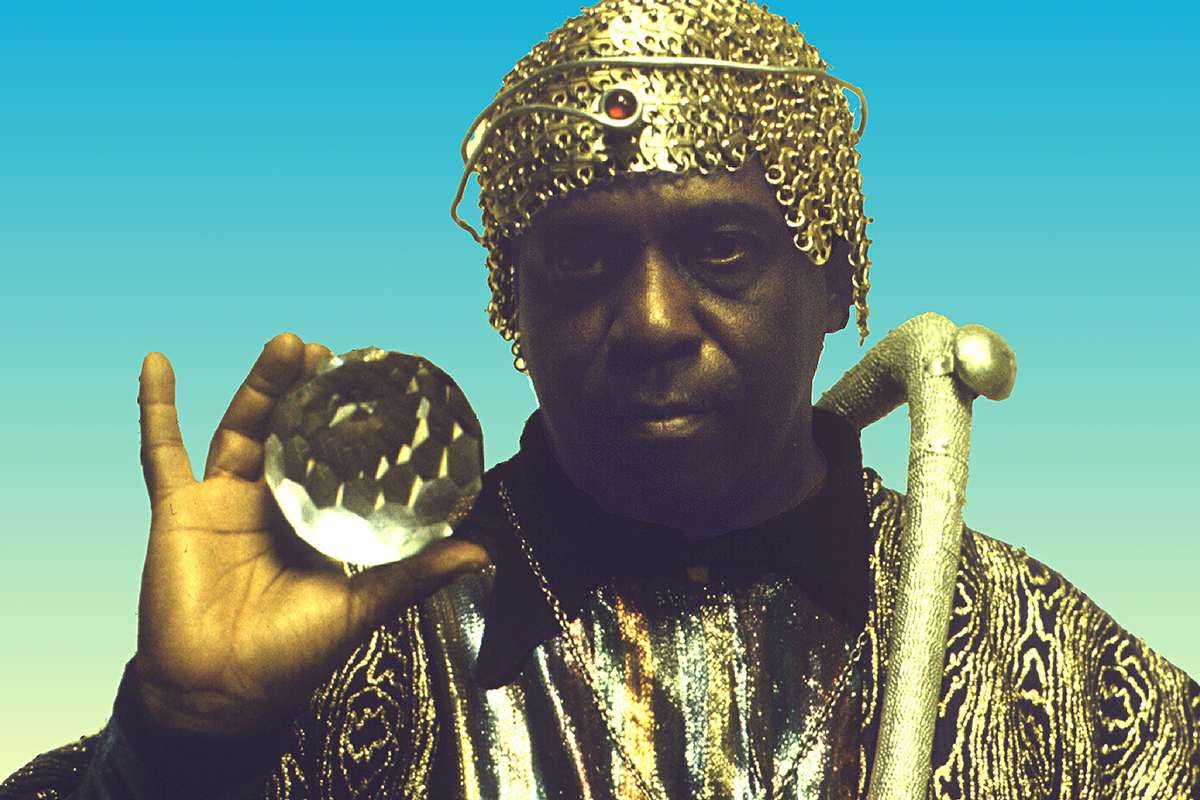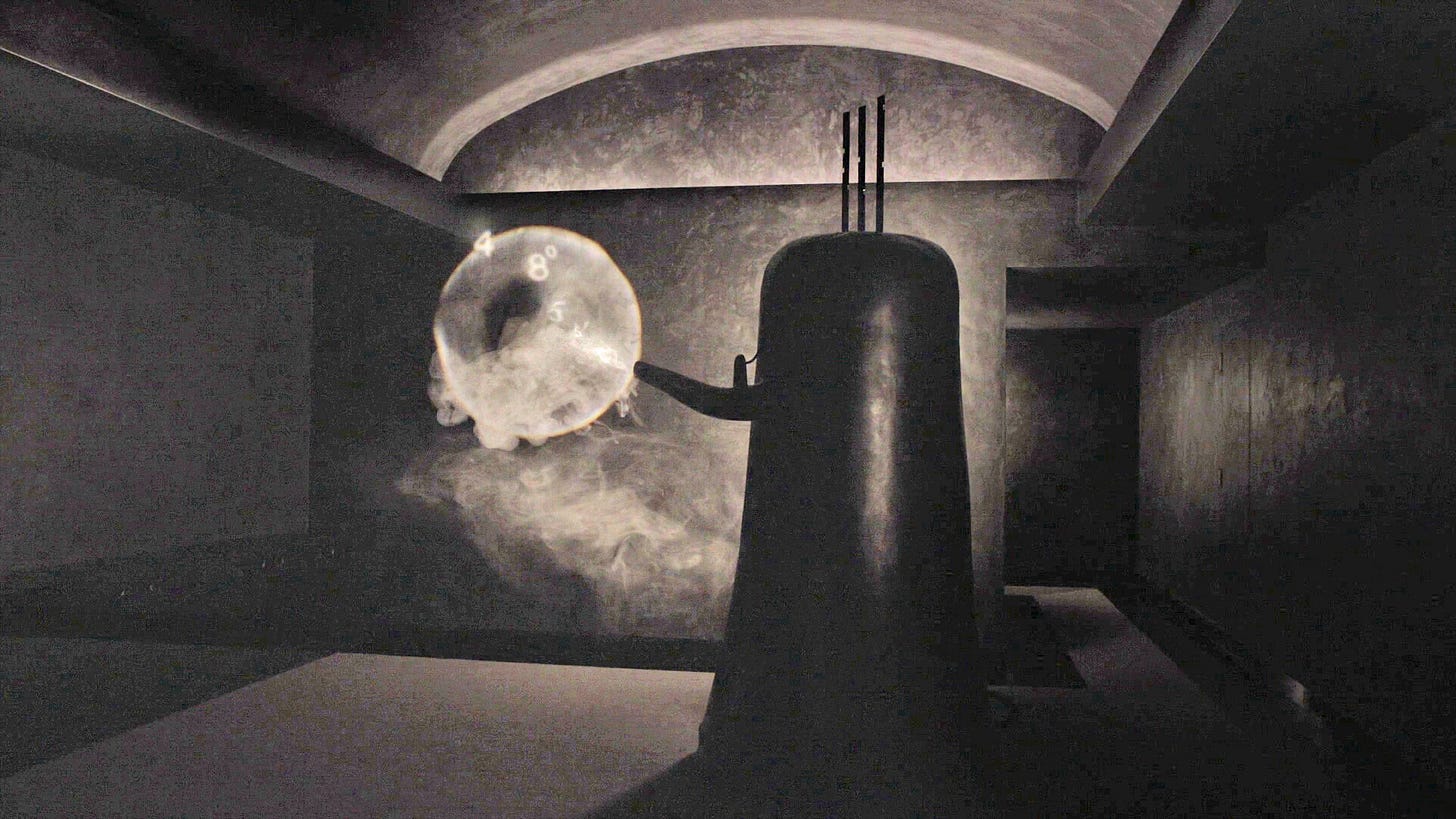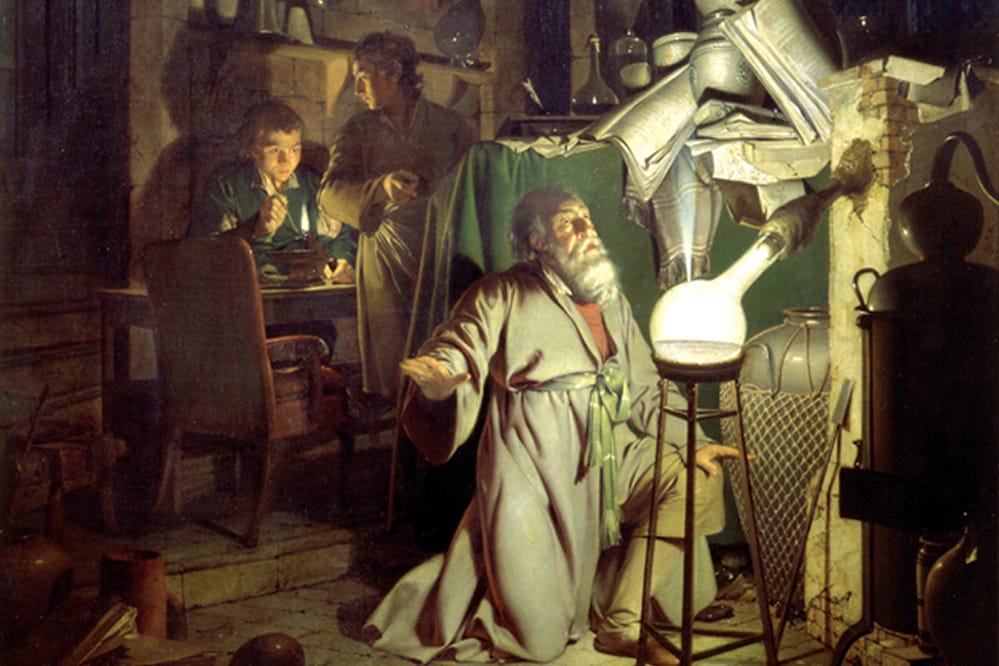Here’s an idea for you.
There’s a Sun Ra quote that gets thrown around—I ran into it again on Twitter the other day:
“I think musicians are on a superior level, but unlike scientists, they haven't been accepted for their abilities.”
When I encountered Sun Ra’s music and writing in college I didn’t really take it seriously; from the secular, middle-class, atheistic perspective that (let’s face it) most of you reading this blog have, ideas like this sound nice, and can be taken in a hippie-ish way to mean, “Yeah, go for it, man, experiment. Be like Captain Beefheart. Now there was a guy who really pushed the limits.” In other words, it’s a wacky way of looking at things from an artist who made some really spacey, kooky, psychedelic stuff. But we all know better, right? I mean, musicians can’t assemble a rocket or sequence the human genome. The world has been thoroughly understood and documented through the scientific method. So Sun Ra is just some guy who took some acid once who had some fun ideas.
Which is all to say, I imagine it wouldn’t occur to you to take this idea at face value. But that’s exactly what I (and he) would encourage you to do!

My friend Phelps sent me an incredible research paper the other day: “Fatigue as an unconscious refusal of the demands of late capitalism”. It’s a great read and it might just change your world a little. And the weird thing is, as I got towards the end of the paper, I realized its author, Amanda Diserholt, was basically investigating the same thing that I had been “investigating” or uncovering in a song I was writing.
Without going into too much detail (and because the song is on my new album and I don’t want to spoil it), here’s the paragraph that leapt out at me:
“Falling asleep protects against the division as it refers to the function of fantasy, according to Lacan. The fantasy involves imagining a point in the future where one has no tension, where the imaginary halts the […] piling up of incomprehensible demands, making it possible to forget the confines of the body and society. Fatigue could then partly be a way of falling asleep in the fantasy, a way of disappearing therein and mergin with the object of ‘nothing’ in order to obtain what is called in Lacanian language ‘real joussance’. Sleep becomes a solution, a way of removing the tension of discrepancy and a place of bliss, comfort and safety, free from pain and responsbilities. One becomes whole and has no needs or desires; one needs nothing and no one.”
This was exactly what I had been trying to get at in my writing, in a song called (naturally) In Your Sleep—the idea of seeking escapism in your literal dreams, i.e. in sleep as a way to feel whole, and the irony of how the “place of bliss, comfort, and safety” as Diserholt puts it is also the place where you become nothing—which is also kind of what happens to you in the real world when you give yourself up to the pressures of our stressful reality, or put another way, the pressures of late-stage capitalism. The point being: either way, towards dreams or towards reality, for all your striving or letting go, you’re tracking towards nothingness.

That felt like an interesting place to write from.1 Investigating unresolveable contradictions is basically the whole point of writing songs for me (there you go, I’ve given up all my secrets), and this was a particularly interesting one. The only difference between me and the research paper is that in music I think some of this investigation necessarily happens unconsciously: you’re trying to find words that fit the scansion and rhyme and make some sense with the feeling you’re trying to get across, and so you stumble into areas of meaning that you never expected to find. Which is broadly pretty similar to doing research: you have the seed of an idea, then you test it and try to make it fit with a bunch of other ideas and evidence and eventually you have something a little bit stronger than just a vague hypothesis.
Anyway, getting back to Sun Ra’s talk of musicians operating on a higher level—I think he was on to something. If you stop and think for a second, the moments in history when real advancements have been made often happened when the arts and the sciences were in conversation together. I don’t really need to tell you, but consider: Athens, the Enlightenment, or how about the 1960s? Sure, in the 60s we didn’t really get anywhere, but for a minute, anything was possible: Rockets. Computers. Civil Rights. Equality. And some pretty good records came out, too.
I’m not going to try to tell you that artists were responsible for all of that. They weren’t—but the dialogue between artists and intellectuals (who, by the way, weren’t really separated into different categories until the Enlightenment) produced the sparks to light the fires of ideological and technological revolution that changed the world.
And the way this happens, by the way, is the same on either side of this arbitrary divide between art and science: people stumble around blindly, doing ridiculous things like searching for the Philosopher’s Stone by boiling piss until they accidentally discover phosphorous. Sometimes stupid is how you get to smart.

Today it seems research is largely uncoupled and siloed away from the art world, but it’s my belief that both of these camps are just as capable of producing innovation. The art world is in fact the faster of the two, and tends to discover things first—think of all the sci fi novels that have “predicted” the future that has come to pass—but it’s less precise. Social movements also often begin with people just bumbling around having ideas and making art and starting bands and writing manifestos long before those ideas can be tested and codified into broadly accepted thought.
Okay, so now let’s get back to what art can and can’t do, politically speaking.
The famous Oscar Wilde quote “All art is quite useless” gets referenced a lot. And I agree with him. But I think a lot of people take it the wrong way. In fact, its meaning is lost without its original context:
"We can forgive a man for making a useful thing as long as he does not admire it. The only excuse for making a useless thing is that one admires it intensely.
All art is quite useless."
Nowadays we are encouraged, by the pressures of late capitalism, to only admire “useful” things, in so much as they are useful in that they hold market value.2
Oscar Wilde’s actual point, if I may be so bold, was not that art has no value, just that it has no direct function, except to be admired (which is cool, in his view. Who needs things to be useful?)
But in that admiring, we sort of define ourselves, don’t we? Not to say that you are what you like, but we are drawn to things that remind us of the identity we want to have. Think about your record collection (you’re reading a music blog. I know you have vinyl).
As Liam Baranauskas put it in a recent article for the Baffler: “Your queue of physical media is aspirational: it is for connecting with who you want to be.”3
What I’m getting at here is that art has one up on our secular modern science in that, as you admire it, the window to your heart is open. A great song can radically alter the course of your life: maybe a song with a vivid depiction of a place reminds you of your childhood home, and persuades you to move back there someday (I know, because that’s what happened to me, on some level). Maybe a stupid repetitive song with pretty dumb lyrics but performed so brilliantly as to cross over into the sublime in spite of its humble recording reminds you that there’s more to life than your career, and prompts you to leave your job. Or maybe it’s smaller than that, it just makes you take a walk for 10 minutes longer than you might have otherwise because you want to hear the rest of the album, but that extra 10 minutes of time to think idly about your life prompts some new private discovery that you wouldn’t have had time or space to think of if you had just gone home and cooked dinner.
Above: here’s a song that might change your life, despite not really having a clear and specific message.
The point is, the change that art can effect is personal, and subtle. But also: huge. You can’t change someone’s mind with a song, but you can access their (wild) heart. On an individual level, if I write a song and it has an effect on your life, big whoop, who cares. But in a society where people take the time to listen to music, and there are enough artists talking to each other and to their friends who, say, are into research papers, or maybe even write them, then at scale we’re looking at a larger network effect, where a tiny idea can have a broader influence. I doubt my silly little song about, what—going to sleep?—will be a big hit or have any big effect on a lot of people. But it will go into the slipstream of music that can be listened to, and maybe admired, and that can have the knock-on effect of, well, emotionally manipulating the listener to feel something they weren’t expecting to feel that day, which is a powerful place to start.
The problem with the internet is that the easiest emotion to transmit through the current social networks is outrage. Just simply getting people mad creates a big balloon of anger-motivated posting. Again, I don’t need to spell this part out; you know what I’m talking about. And that anger, which could go towards something, usually doesn’t, because anger is kind of a fleeting emotion. It’s easy to get angry, but as the saying goes, it’s a lot of work to stay angry. It either just dissipates, or, if like what’s happening now, you’re constantly provoked into outrage, then it sort of lessens the spectrum of things you can feel. And we wonder why depression is on the rise!
I believe that whatever new world is coming (and it is coming, one way or the other), it’s going to have to start with a broader spectrum of feeling if we’re going to get anywhere. If everyone’s just mad all the time, we’ll be divided, because it’s so easy to turn that anger on anyone, especially people close to you. If you plant the seeds of anger, you get more anger. But if you give people something personal, if you tell them something hopeful, if you actually use your imagination and dream a dream worth sharing and expressing and realizing, then you might actually get somewhere.
Above: Here’s a song that succeeds in its political messaging by getting personal: (“You’re gonna have to serve somebody—yes you are!”, and remains ambiguous even as it gets specific, which gives the listener room to have their own thoughts: who is it that you’re gonna have to serve?
I may get some pushback on this, but it feels like the avenue of online discourse and sharing stuff on Instagram is increasingly closed as a way to effect any kind of political change, if it was ever truly open. But the avenue of creative expression feels strangely untapped, especially in the work that you can just make and share with your friends and peers, outside of social media.
OK, but here’s where I really get into hot water, though: this work cannot be protest songs.4 If you write a song that is explicitly or even implicitly in protest of X, you will never get anywhere with anyone. The people on your side who listen to your song will just feel like they’ve already protested, in the same way that listening to NPR kind of encourages you to do nothing, that “staying informed” is enough, and that there’s nothing more you can do about what’s going on in the world anyway. And the people who aren’t on your side will just ignore you—you’ll never reach them.
Instead, we have to look inwards. What is in your heart? Look. Tell me. What’s in there? Do you like it? Do you not like it? How do you feel about it? Do you want to feel that way? Tell me about it. Make me feel what you feel. Make me feel anything at all!
That’s how you make good art, and that’s how you change the world. Ok, we’re done here.
Thanks for reading!
—
I’m thinking about doing some bonus subscriber-only posts on the weekdays if and when I have time. If that’s something I can even do on here, I haven’t checked yet. So if you want to get in on the ground floor of that, now’s the time.
Subscribing is of course free, except for the exchange value of giving me your email address.
Editor’s Note: I changed the title (original title: “Don’t Write Protest Songs”) and removed the first few sentences. Everything about the title and the start of this post was badly timed with the online discourse that coincided with it going live on Sunday and I think it was possible to misread my provocation in the intro as sincerely arguing that protest movements are bad, or that politics don’t belong in art, or something to that effect. Obviously not my intent! I think everyone who read the whole post figured that out, but I’m leaving this note here just in case.
Next week’s post should be a bit more focused on music and I won’t be trying to make any broader points about society like in the last couple.
And as you’ll someday hear I was writing over some wonderfully tonally ambiguous chord changes I had found, but for now I’ll stop telling you how cool my song is that you haven’t heard yet
And we in fact admire those things that we perceive to be “valuable” quite intensely: we laud Tesla for creating the electric car—a feat which was accomplished at the turn of the century—the 20th one. Why didn’t it catch on? Market incentives.
In contrast to streaming, which is “for forgetting who you really are. And if we forget the shape of our collective dreams, it’ll be a lot easier to take us out of the dream-making process entirely.” Oh, just read the article.
Or protest art, if you’re not a musician. I swear this is still a music blog




I did a report on hennig Brandt once, and we decided to do it as a short theatrical reenactment, instead of a paper. Went really well